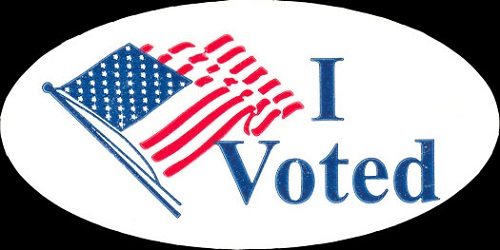
November 5, 2014;NBC News
Go figure. Democrats in battleground races got smashed everywhere on Election Day, but state ballot initiatives generally associated with Democrats generally passed.
- Colorado and North Dakota voters rejected “personhood” initiatives aimed at virtually ending women’s control over reproductive rights—even though at Republican Cory Gardner ousted incumbent Democrat Mark Udall in Colorado’s U.S. Senate race and North Dakota is pretty resoundingly Republican (bucking the trend, however, Illinois voters approved covering contraceptive coverage in health insurance plans)
- Minimum wage ballot questions passed in Illinois, South Dakota, Nebraska, and Arkansas—and, though the final vote totals aren’t in yet, in Alaska too, despite Republican Tom Cotton’s trouncing Democratic incumbent Mark Pryor for the senate seat in Arkansas, Republican Mike Rounds nearly doubling the vote total of Democrat Rick Weiland for the U.S. Senate seat previously held by Democrat Tim Johnson, Republican Ben Sasse more than doubling the vote total of Democrat Dave Domina for that state’s vacant senate seat, and Republican Dan Sullivan upsetting incumbent Democrat Mark Begich in Alaska. And in Illinois, that blue state found itself with a Republican governor going to Springfield.
- While Democrats across the country appeared to run far and fast from gun control, voters in Washington state approved a ballot question to require background checks on all gun sales and transfers and rejected a competing initiative that would have prohibited background checks of that sort until a federal standard became law
- It isn’t clear that many Republicans other than those with libertarian streaks support legalizing marijuana for recreational use, but that is what voters did Alaska, Oregon, and Washington DC (though Florida rejected an initiative to legalize medical marijuana)
- Amazingly, Denton, Texas voters approved an anti-fracking initiative, but anti-fracking initiatives in San Benito County and in Santa Barbara, California, went down to defeat
The only ballot area where Democratic-oriented measures seemed to fail concerns taxes. In Georgia, where Democrat Michelle Nunn lost to Republican David Purdue for the Senate seat vacated by Saxby Chambliss, voters approved language capping the state’s maximum income tax rate at the level in effect as of January 1, 2015. Nevada’s voters rejected a two percent margins tax on businesses that would be used to pay for public schools. North Dakotans overwhelmingly rejected the idea of imposing mortgage, sales, or transfer taxes on real property transactions. And in Tennessee, where the state income tax only hits interest and dividend income, voters made sure that no other tax on payroll or other kinds of earned income would ever emerge.
Sign up for our free newsletters
Subscribe to NPQ's newsletters to have our top stories delivered directly to your inbox.
By signing up, you agree to our privacy policy and terms of use, and to receive messages from NPQ and our partners.
//
The disconnect on the Democratic or progressive side is intriguing. Voters supported initiatives that would increase or protect individual liberties and choice, such as opposing reproductive rights restrictions and the supporting minimum wage initiatives. However, beyond these individual rights questions, Democrats found themselves unable to successful convey some communal issues such as taxation.
The Democratic disconnect raises questions about what “Democrat” means in the minds of the voters. Given the Democratic Party’s inability to close the deal on the taxing and fracking questions, the Democratic message seems to be garbled and in need of repair. But the question for NPQ readers is about the nonprofit message behind some of these initiatives. While voters turned out Democrats (and made a few more like Virginia’s Mark Warner sweat unexpected bullets) in a repudiation of President Obama’s leadership, they supported in some of these initiatives not partisan Democratic messages, but messages of fairness—minimum wage, reproductive rights, paid sick leave—that appealed to voters in a bipartisan way. Where nonprofits have fallen short, it is in explaining to voters the importance of necessary government revenues to support the government’s role in working in tandem with nonprofits to provide support to people and communities in need.—Rick Cohen














